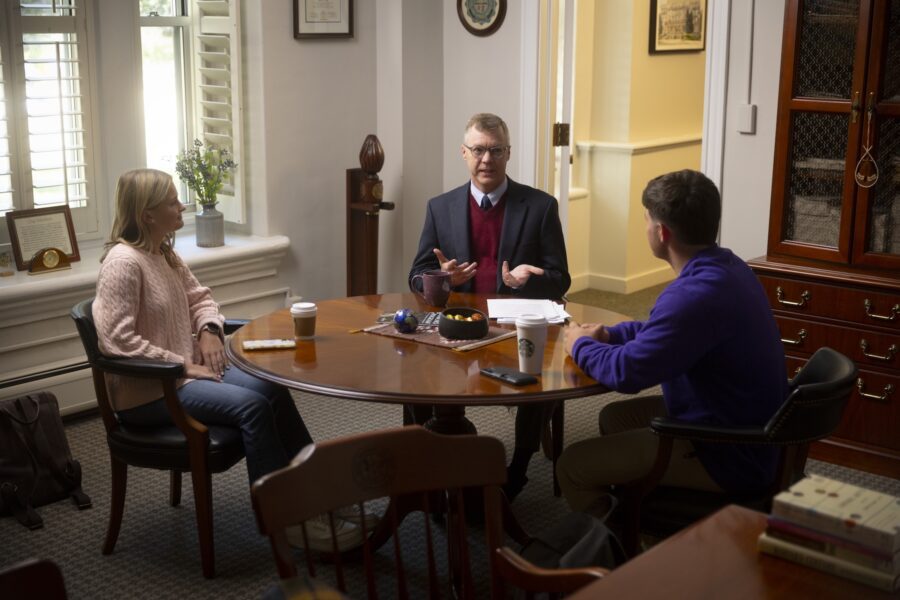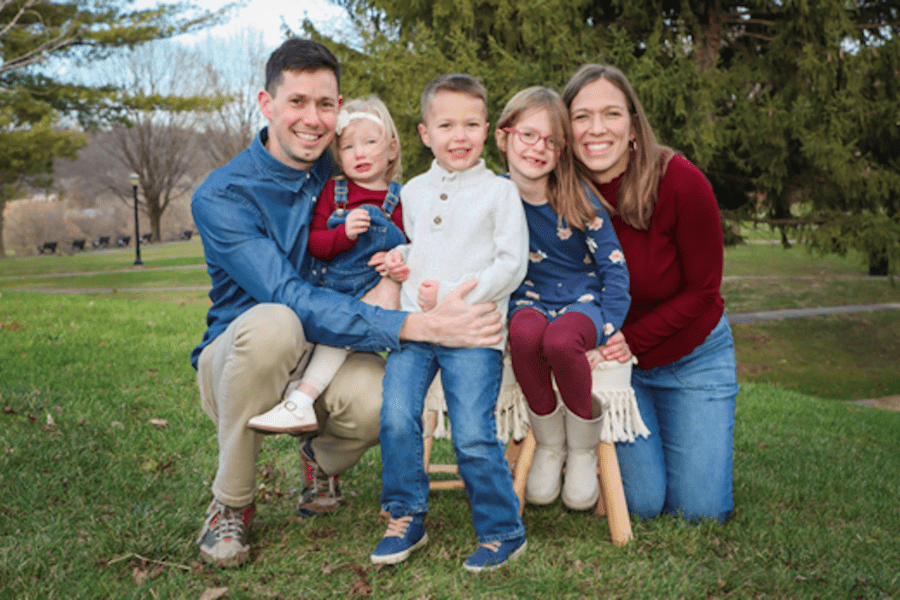
My guess is that you are familiar with our tagline, “We Believe. You Belong Here.”
Olivet’s marketing office began using it in 1994. The tagline creatively connects faith with a personal invitation to call ONU home: We have faith, there is a place for you here, and we think you should join us.
Our tagline also taps into one of humankind’s most central social motives: the need to belong. According to the American Psychological Association (APA), the need to belong is “the motivation, rooted in both biology and social norms, to be part of relationships, to belong to groups, and to be accepted by others.“
Belonging and Loneliness
Belonging is a universal human need. We feel lonely when our needs for love and belonging are unmet. Neuroimaging research shows that not belonging activates the same areas of the brain that experience physical pain. God said it is not good for us to be alone (Genesis 2:18). We need to belong.
Those who fail to satisfy their need to belong suffer various short-term and long-term physical and psychological consequences. Multidisciplinary research spanning several decades shows that loneliness is associated with anxiety, cardiovascular disease, dementia, depression, diabetes, hypertension, premature death, self-harm, stroke, suicidal ideation and a weakened immune system. Statistics show that loneliness is as bad for your health as smoking 15 cigarettes a day. Loneliness is as much of a risk factor for mortality as several other known causes, including injury, a lack of access to medical care or vaccines, obesity, and substance abuse and violence.
Researchers conceptualize loneliness as a discrepancy between what one wants and what one has regarding the frequency, quality, quantity and variety of social connections. Seeing your best friend once a week may help you feel connected, unless you want to see him or her several times a week. A person with three friends might feel connected, unless he or she wants more than three friends. Another person, surrounded by others, might feel lonely if these relationships are not strong. This is why people who seem well-connected can sometimes feel lonely. Strong and stable relationships are important, but so are our perceptions of those relationships. The experience of loneliness is subjective.
In addition, connection and loneliness change over time and across situations. People with strong and stable connections may become disconnected and lonely when their circumstances change. Last, some groups and people are more likely to be connected (or lonely) than others.
Experiments on Loneliness
Loneliness is sometimes studied in a laboratory by asking a participant to play a virtual game of catch with two others. However, the participant is unaware that the others are computer-generated. The game is often structured to include the participant in only the first few throws. The ostracized participant then becomes an outside observer as the others continue to play. After the game’s conclusion, the researchers assess the impact of being ostracized. Used in over 200 published studies, this paradigm shows that feeling excluded greatly impacts intrapersonal outcomes (e.g., sense of belonging, control, self-esteem and mood) and interpersonal outcomes (e.g., enjoyment of the game, satisfaction with the other two players and aggression toward the others).

In a different kind of experiment on the effects of loneliness, Chen-Bo Zhong and Geoffrey Leonardelli randomly assigned University of Toronto students to either remember a time they were socially excluded or a time they were socially included. At the end of the study, the laboratory maintenance staff asked each participant to estimate the lab’s temperature. Unbeknownst to the participants, this was the study’s main outcome variable. The results were striking: Those in the exclusion condition thought the lab was significantly colder than those in the inclusion condition. This experiment sheds light on the impact of social exclusion. This study also illustrates the dynamic relationship between the mind and the body — the mind-body connection — and why something psychological can have physical consequences.
Belonging and Loneliness at School and Work
Students and employees suffer when they feel like they do not belong. Research shows that students who feel like they do not belong are more likely to act aggressively, drop out, eat more junk food, feel depressed and underperform. Industrial-organizational psychologists show that employees who feel disconnected tend to experience lower job attitudes, performance and well-being. In addition, data indicates that loneliness at work is associated with absenteeism, burnout and stress. Lonely employees are also less likely to be creative, engaged and innovative.
The negative consequences of not belonging motivate us to seek strong, stable relationships. Connecting with others benefits us in many ways and helps eliminate unpleasant feelings and thoughts accompanying isolation and loneliness. Belonging helps us thrive. Consistent with this, educational research shows that belonging is positively correlated with grades, life satisfaction, self-esteem and well-being. Higher levels of job satisfaction and a decreased likelihood of quitting exist at organizations that facilitate connections with the organization and others at work (such as new employee orientation, onboarding or mentoring). Employees who fit with their organization, job, work group and supervisor tend to have higher job satisfaction and organizational commitment and are less likely to quit. A study I conducted with two ONU undergraduates (Elijah Decker ’20 and Kate Klavohn ’21) revealed that people who say they fit with their job, organization, group and supervisor are less likely to feel lonely.
A Biblical Basis for Belonging
Our deep need to belong should not be a surprise. God is relational, and we are made in His image (Genesis 1:27). He existed before us as Father, Son and Holy Spirit (Genesis 1:26) and invites us into this holy, intimate and reciprocal fellowship. We were made to belong, connect and relate. But herein lies the problem: On this side of eternity, our connections with God, others and creation will be strained. Sin disrupts these connections and exacerbates our need to belong. It is quite the paradox: We need to belong, but it is hard to get that need met, making the need even greater.
Heartbeat and Mission
This brings me back to our tagline, “We Believe. You Belong Here.”
Believers and unbelievers alike have been affected by the disrupted connections produced by sin. Everyone struggles to connect with God, others and creation. For this reason, our tagline is universal.
Our tagline is also timely. In a recent Gallup poll, 39% of U.S. college students said they felt lonely the previous day. A recent study published by the APA showed that a fair proportion of employees feel lonely when working. In addition, a 2018 survey found that nearly half of U.S. adults feel lonely. Last year the U.S. surgeon general called loneliness an epidemic and released an advisory responding to rising levels of loneliness, isolation and disconnect. Connecting with others at work is a significant part of the surgeon general’s “Framework for Workplace Mental Health & Well-Being,” published in 2022.
Loneliness is rising, and the physical and psychological toll of not belonging is significant. Perhaps our tagline is more relevant than ever because of this.
“We Believe. You Belong Here.” may be a refreshing message to prospective students and employees searching for somewhere to belong or something to belong to.
But it is more than a tagline or clever marketing strategy. It is the heartbeat and mission of Olivet. The loneliness epidemic hits here, too. We need to help the students and employees we bring to campus feel and know that they belong. Doing so allows us to fulfill our mission and introduce others to the One who knows about our need to belong (and every other need we have) (Matthew 6:8).
Several of our five-year University PAVER priorities address belonging. For example, supporting student success and fostering Persistence are practical ways to show at-risk and struggling students that we believe they belong (and should stay). We also help deserving students feel like they belong by addressing the Affordability of an ONU education. Increasing access to an ONU degree tells those with a financial need that we believe they belong. Given the Biblical underpinnings of belonging (and that it is a universal human need), then it is a matter of Virtue that we would emphasize, model, practice and teach belonging. Last, some students belong at ONU but have not heard of ONU. Recruitment strategies to find and welcome them to campus are consistent with our belief they belong.
More specifically, here is a partial list of some initiatives, offices and services on our campus that also foster belonging: Accessibility and Disability Resources, Career Development, Chapel, the Center for Academic Excellence, the First Year Seminar, General Studies, JumpStart conference for new students, Multiethnic Student Services, Physical Plant, Public Safety, Recreation and Campus Life, Sodexo, Student Development, and THRIVE counseling services. Each plays an important and specific role in showing students we believe they belong.
There are many ways to make students and employees feel like they belong. Building connections, community and trust can help. The likelihood of belonging increases when there is communication, support, and space and time to connect. Recognizing performance, providing opportunities for growth and development, and treating others with dignity and respect are also important.
As a professor, I am most familiar with academic strategies that foster student belonging. Belonging can be addressed through advising, clear (but warmly written) syllabi, communicating and demonstrating care, diverse examples, fair treatment, filing retention alerts, holding office hours, incorporating Universal Design (UDL) principles, learning (and using) names, recognizing growth and teaching well.
I often tell prospective students and their families that ONU is a laboratory for faith, learning, life and relationships. Though we value relationships, sometimes our connections with others are tested. But when we put our faith into practice, our relationships deepen, and we learn more about ourselves, each other and the Lord. Employee and student belonging is nurtured when we demonstrate forgiveness, hospitality, humility, reconciliation, repentance, sacrifice and trust. How we relate to each other will show everyone that we are His disciples (John 13:35).
Our tagline is universal, relevant and timely because the message is timeless. A friend of sinners (Matthew 11:19), Jesus came to seek and save the lost (Luke 19:10) and is the kind of Shepherd that would leave a flock of 99 sheep to find one that was lost (Matthew 18:12–14). His sacrifice removed the barrier between God (Matthew 27:51) and us. He wants no one to perish (2 Peter 3:9) and rejoices greatly when someone who belongs to Him is found and returned (Luke 15:5–7). No one is invisible in God’s Kingdom (Psalm 139:7–10), and no contribution is insignificant (1 Corinthians 12–27).
So, we believe that you belong here. Our faith leads us to value individual students and workers, commit to fostering community and emphasize belonging. He believes you belong, and this universal, relevant, timely and timeless message leads us to believe you belong.
From Olivet The Magazine, A Need to Belong – Summer 2024. Read the full issue here.





